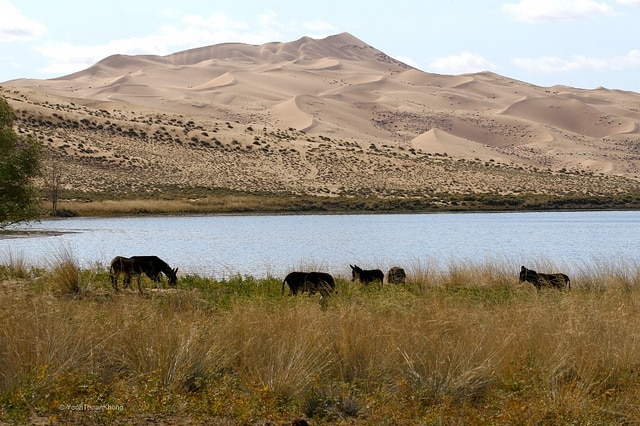Six hours and five minutes later I crossed the finish line of my first marathon.
The inspiration for running a marathon came from a post-it note on my bedroom wall. When I arrived in Beijing last September, I wrote down three goals for the year and hung them up as a daily reminder. I accomplished my first two goals – getting accepted to graduate school and achieving a fluency in Chinese. My last goal of being in the “best shape of my life” was a bit more ambiguous. What could I do that would check off this box? Running the Genghis Khan Extreme Marathon in the grasslands of Inner Mongolia would unquestionably do this, but the idea of running 26.2 miles was unfathomable. The moderator’s infamous line from The Hunger Games, “May the odds be ever in your favor,” often rang in my head during training. The odds were never in my favor.
The furthest I’d ever run in my life was seven miles, so it was highly unlikely that I could add nineteen miles in three months. Training in one of the most polluted cities in the world was a runner’s nightmare. Long runs on the treadmill at the gym were torture. I felt like a hamster on a wheel minus the luxury of being rewarded with cheese. Long runs through the Summer Palace and Beijing’s parks gave my legs more freedom, but not my lungs. Running for three hours while attempting to breathe through a facemask was suffocating. Consequently, I ended my training two weeks early because running was no longer enjoyable. My longest run was 16 miles, which was not ideal.
The forty-hour bus ride to the marathon site was also not ideal. My boyfriend and I took a thirty-hour train from Xinjiang to the capital of Inner Mongolia, followed by a ten-hour sleeper bus to the race destination. Sleeper buses in China are the most economical way to travel. However, they are unsanitary and extremely uncomfortable. In 2009 after traveling on one in Yunnan, I contracted a flesh-eating bacteria that left me hospitalized. This time, there was no bacteria — just chewed gum stuck on my seatbelt.
On the bus, I tried to concentrate on the beautiful vast grasslands outside my window, except I couldn’t shake the feeling of nausea that was slowly creeping up inside of me. When the bus driver pulled over in a field to let passengers use the bathroom, I began to get sick. The only comfort was that the nighttime sky in Inner Mongolia is one of the most beautiful I have ever seen. It had been so long since I had even seen a few stars, and that night the sky was filled with them. I climbed back on the bus hoping my stomach would settle down for the last few hours of the trip, which of course it didn’t. I had to get sick in a plastic bag that the bus driver had given us to put our shoes in. The bag was too thin, so it resulted in my vomit seeping onto my blanket. I arrived to the marathon site feeling sick and exhausted – exactly opposite of how a runner should feel the day before the big race.
I decided to lie in bed for the entire day and block all thoughts of the marathon from my mind. Less than one percent of the world completes a marathon. If I calculated the chances of me crossing the finish line, I wouldn’t even bother to show up to the starting line. I decided to take the option of failure off the table, and so I succeeded.
Succeeding wasn’t easy. In fact, it was painful and agonizing. In that six-hour journey I learned a lot about myself. I learned that will power and perseverance take you further in life than anything else. It’s what got me to the finish line.
When you hit those rough patches, don’t quit. If you quit, you only relieve yourself temporarily. Living in your dream, regardless of how uncomfortable it may be at times, is far better than not. If you give up, you’ll never know what wonderful things wait for you ahead. You’ll never get the chance to run past the verdant rice terraces or the sheep by the river. Also, after every uphill battle comes a smooth sail downhill.


